-
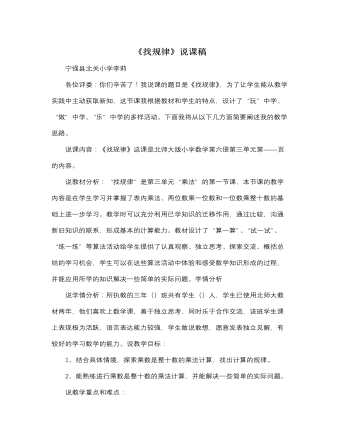
北师大版小学数学三年级下册《找规律》说课稿
(三)、巩固反馈师:同学们的表现真的令我出乎意料,你们太聪明了,今天我就带大家去数学王国去参观,敢去吗?如果你们能闯关成功就可以免费进入王国的游戏宫,有信心吗?(激励学生,让同学们很快进入巩固练习这个环节中来)第一关:逛同学恩喜爱的食品店(这一关的设计采用抢答的方式进行,更进一步激发学生的学习兴趣,而且巩固了本课重点——计算规律。)第二关:我们来到了你们的妈妈喜欢服装店(这一关先让学生独立尝试,并抽生板演,全班订正,注意强调答语的写法。)第三关:现在我们来到了养鸡场。(这一关仍然采用抢答的方式进行,这道题目主要考察同学们对第二条规律的掌握情况)第四关:进入数学王国继续玩抢答游戏和猜一猜活动(这个环节让学生体会到学习的乐趣)
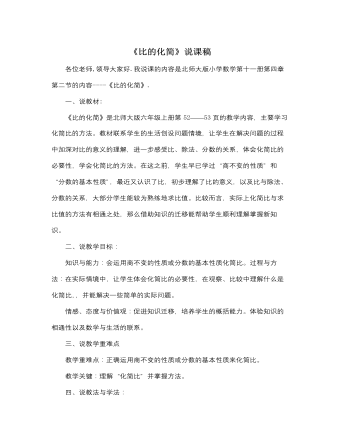
北师大版小学数学六年级上册《比的化简》说课稿
《比的化简》是北师大版六年级上册第52——53页的教学内容,主要学习化简比的方法。教材联系学生的生活创设问题情境,让学生在解决问题的过程中加深对比的意义的理解,进一步感受比、除法、分数的关系,体会化简比的必要性,学会化简比的方法。在这之前,学生早已学过“商不变的性质”和“分数的基本性质”,最近又认识了比,初步理解了比的意义,以及比与除法、分数的关系,大部分学生能较为熟练地求比值。比较而言,实际上化简比与求比值的方法有相通之处,那么借助知识的迁移能帮助学生顺利理解掌握新知识。二、说教学目标:知识与能力:会运用商不变的性质或分数的基本性质化简比。过程与方法:在实际情境中,让学生体会化简比的必要性,在观察、比较中理解什么是化简比,,并能解决一些简单的实际问题。情感、态度与价值观:促进知识迁移,培养学生的概括能力。体验知识的相通性以及数学与生活的联系。
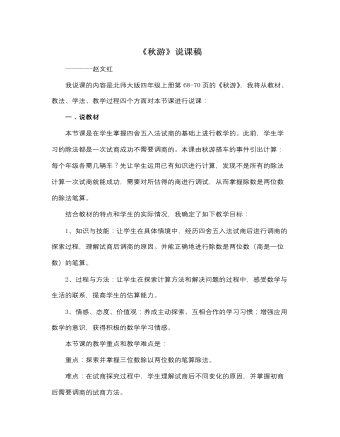
北师大版小学数学四年级上册《秋游》说课稿
我说课的内容是北师大版四年级上册第68-70页的《秋游》,我将从教材、教法、学法、教学过程四个方面对本节课进行说课:一.说教材本节课是在学生掌握四舍五入法试商的基础上进行教学的。此前,学生学习的除法都是一次试商成功不需要调商的。本课由秋游搭车的事件引出计算:每个年级各需几辆车?先让学生运用已有知识进行计算,发现不是所有的除法计算一次试商就能成功,需要对所估得的商进行调试,从而掌握除数是两位数的除法笔算。结合教材的特点和学生的实际情况,我确定了如下教学目标:1、知识与技能:让学生在具体情境中,经历四舍五入法试商后进行调商的探索过程,理解试商后调商的原因。并能正确地进行除数是两位数(商是一位数)的笔算。2、过程与方法:让学生在探索计算方法和解决问题的过程中,感受数学与生活的联系,提高学生的估算能力。
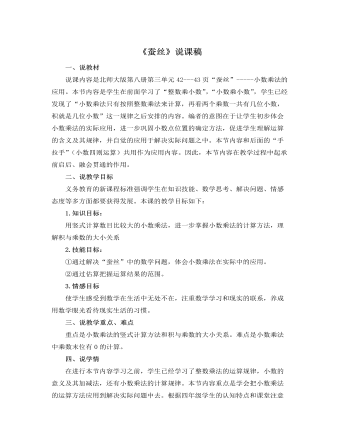
北师大版小学数学四年级下册《蚕丝》说课稿
三、说教学重点、难点重点是小数乘法的竖式计算方法和积与乘数的大小关系。难点是小数乘法中乘数末位有0的计算。四、说学情在进行本节内容学习之前,学生已经学习了整数乘法的运算规律,小数的意义及其加减法,还有小数乘法的计算规律。本节内容重点是学会把小数乘法的运算方法应用到解决实际问题中去。根据四年级学生的认知特点和课堂注意力时间有限的特点,在教学中一定要提高课堂效率五、说教法、学法在本课教学中,我采取的教学方法是:1.通过复习,回顾计算规律,并把它应用到竖式中去。2.情境展示,把数学问题直接放在实际问题中来学习并解决。3.解决问题时采用自主探索、独立思考和小组合作交流的学习方式。通过这些教学法激发学生学习的积极性和主动性,引导学生把学到的规律应用到现实生活中来解决实际问题。六、说教学过程(一)举例说明积的小数位数与乘数小数位数的关系。通过比眼力,做一做,复习前一节课所学内容,为本节课打下基础。
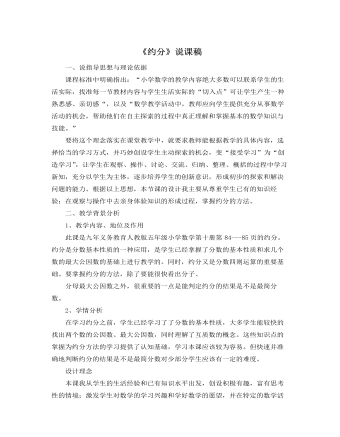
北师大版小学数学五年级上册《约分》说课稿
课程标准中明确指出:“小学数学的教学内容绝大多数可以联系学生的生活实际,找准每一节教材内容与学生生活实际的“切入点”可让学生产生一种熟悉感、亲切感“,以及“数学教学活动中,教师应向学生提供充分从事数学活动的机会,帮助他们在自主探索的过程中真正理解和掌握基本的数学知识与技能。”要将这个理念落实在课堂教学中,就要求教师能根据教学的具体内容,选择恰当的学习方式,并巧妙创设学生主动探索的机会,变“接受学习”为“创造学习”,让学生在观察、操作、讨论、交流、归纳、整理、概括的过程中学习新知,充分以学生为主体,逐步培养学生的创新意识,形成初步的探索和解决问题的能力。根据以上思想,本节课的设计我主要从尊重学生已有的知识经验;在观察与操作中去亲身体验知识的形成过程,掌握约分的方法。
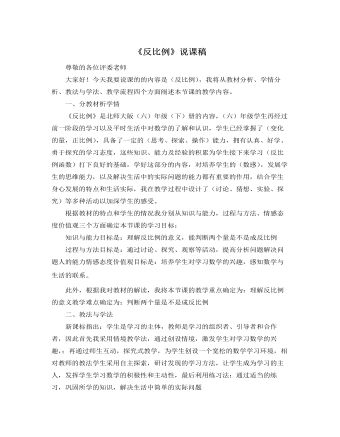
北师大版小学数学六年级下册《反比例》说课稿
知识与能力目标是:理解反比例的意义,能判断两个量是不是成反比例过程与方法目标是:通过讨论、探究、观察等活动,提高分析问题解决问题人的能力情感态度价值观目标是:培养学生对学习数学的兴趣,感知数学与生活的联系。此外,根据我对教材的解读,我将本节课的教学重点确定为:理解反比例的意义教学难点确定为:判断两个量是不是成反比例二、教法与学法新课标指出:学生是学习的主体,教师是学习的组织者、引导者和合作者,因此首先我采用情境教学法,通过创设情境,激发学生对学习数学的兴趣,;再通过师生互动,探究式教学,为学生创设一个宽松的数学学习环境,相对教师的教法学生采用自主探索,研讨发现的学习方法,让学生成为学习的主人,发挥学生学习数学的积极性和主动性,最后利用练习法:通过适当的练习,巩固所学的知识,解决生活中简单的实际问题
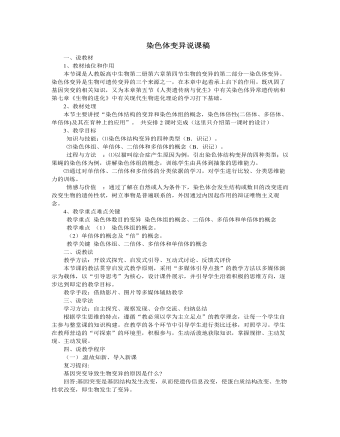
人教版高中生物必修2染色体变异说课稿
四、说教学程序(一).温故知新、导入新课复习提问:基因突变导致生物变异的原因是什么?回答:基因突变是基因结构发生改变,从而使遗传信息改变,使蛋白质结构改变、生物性状改变,即生物发生了变异。那么,基因是什么?它和染色体又有何关系?回答:基因是有遗传效应的DNA片断,染色体是DNA的载体,基因在染色体上呈线形排列。引出新知:对于一个生物体来说,正常情况下,其染色体的结构和数量都是稳定的。但在自然条件或人为因素的影响下,染色体的结构和数量均会发生改变,从而导致生物性状的改变,这就属于染色体变异。(二).把握重点、突破难点重点的把握:1、染色体结构的变异播放影片:猫叫综合征幼儿。让学生观察: 患儿哭声轻、音调高,很像猫叫。教师补充: 患儿的征状---两眼较低、耳位低下,存在着严重的智力障碍。阐述病因---染色体片段缺失
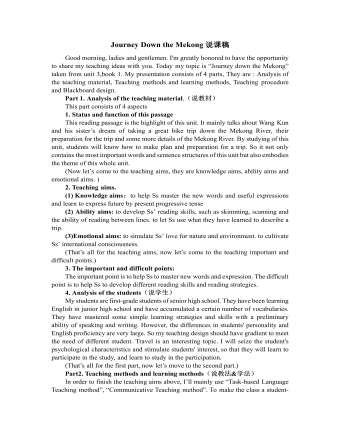
人教版高中英语必修1Journey Down the Mekong说课稿
2. let the Ss complete the forms paragraph by paragraph. Purpose here is to help Ss to get the habit of reading a passage as a whole, and pay attention to the organization of the text, as a result the Ss will fully understand the whole passage.3. ask Ss to retell the passage with the help of the key words in the form.Since the Ss in the class are in different levels, so I let them to fill in the blank to understand the meaning of the words and phrases better. ( That’s all for the while-reading. Now let’s move to the fifth step.)Step V: Post-reading (10mins) ---DiscussionIn this part students are asked to discuss in groups and list Wang Kun’s and Wang Wei’s attitudes about the trip. After that, Ss are encouraged to express their attitudes with the whole class. Collect their answers and don’t forget to praise them even if their answers may not be perfect.In this activity, discussion provides a vivid and active learning environment for Ss to communicate in English with newly learned language items. (Finally it comes to the homework.)StepⅥ: Homework (1min)1. Ss are required to read the text again after class and figure out the meaning of some complex sentences.2. Do the exercises on P19; This can help Ss to consolidate what they’ve learnt and make preparation for the next lessonPart4. Blackboard design.(说板书设计)On the top, there is the title of this lesson. On the left, there are main ideas for each paragraph. On the right, there are some new words and expressions.Unit 3 Travel journalJourney down the MekongMain idea of each para.:Para1: deciding to take a great bike trip along the Mekong river.Para2: Different attitudes between Wang kun and Wang wei.
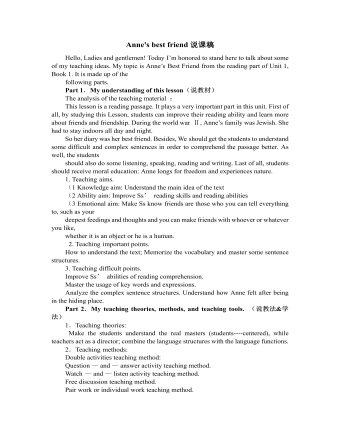
人教版高中英语必修1Anne's best friend说课稿
Step 7 Language points 1.Vocabulary (1) go through (2) set down (3) a series of (4) on purpose (5) in order to (6)at dusk (7)entirely (8)face to face 2.Important sentences (1)…I’ve grown so crazy about everything to do with nature. (2)There was a time when … (3)I stayed awake on purpose until … (4)It was the first time … that I’d seen the night … (5)It’s no pleasure looking through … Purpose: 1.Master the required vocabulary and sentence structures. 2.Use them freely. Step 8 Consolidation 1.Find out the topic sentences 2.Retell the text according to the topic sentences Purpose: I want to know if my students understand the text. Step 9 Discussion Imagine you have to go into hiding like Anne and her family, what would you miss most? Giveyour reasons. Purpose: Train Ss’ oral English ability. Step 10 Homework Write an article on Friends. Purpose: 1. Improve the Ss’ writing ability. 2 Train the Ss’ ability of self—teaching and looking up information by themselves. Part 5 Blackboard design(说板书设计)Unit 1 Friendship Reading Anne’s Best Friend 1.Main idea of each paragraph: Para. 1 Anne made her diary her best friend. Para .2 Anne wrote her feelings in her diary. Para .3 Anne missed nature. Para.4 Anne saw the night face to face Para.5 Anne wanted to experience nature outdoors. 2.Listening: Exx.1 P3 3.Discussion: Exx.3 P3 Purpose: 1.Make Ss familiar with the passage 2.Make the design inductive, instructive and artistic.
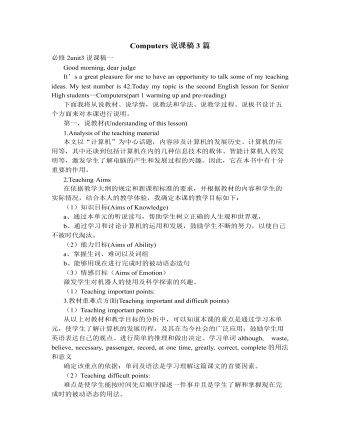
人教版高中英语必修2Computers说课稿3篇
一. 教材分析1. 本单元的中心话题是“计算机(Computers)”,内容涉及计算机的发展历史,计算机的应用等。本节课是该单元的第一课时,我将Warming up, Pre-reading and Comprehending这四部分整合为一节精读课。其中。Reading部分是题为WHO AM I?的文章,以第一人称的拟人手法介绍了计算机发长演变的历史和计算机在各个领域的应用,其主旨是表达计算机的发展变化之快以及在生活中用途之广。而Warming up部分以图片的形式展现了计算机的发展历程;Pre-reading中的问题和排序分别是为了预测语篇的内容和测试学生对计算机历史了解的情况;Comprehending则通过各项练习训练学生的阅读技能,从而加深对文章的理解。可见这几部分是一个有机的整体。2. 教学目标:1) 语言目标:重点词汇及短语:abacus, calculate, calculator, PC, laptop, PDA, robot, analytical, technological, universal, mathematical, artificial, intelligent, network, explore, in common, as a result.重点句子:a. My real father was Alan Turing, who in 1963 wrote a book to describe how computers could be made to work, and build a “universal machine” to solve any mathematical problem.
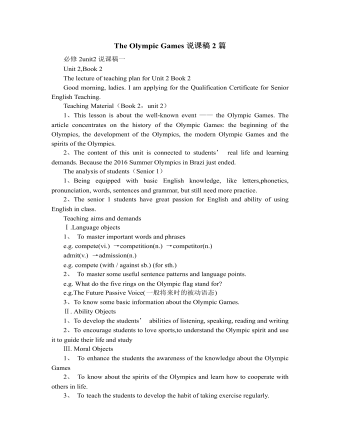
人教版高中英语必修2The Olympic Games说课稿2篇
Purpose of my design:To ask the students to do these two tasks will make the Ss predict the story of this passage. As a result, it will deepen Ss’ memory of this story because they will have their own understanding of this story.Step 3. While-readingTask 1. (Individual work _____min)Skimming: ask students to skim the text and the main ideas of each paragraph in this passage. Please read it quickly and then match the sentences with the letters.Task 2. (Individual work _____min)Scanning: read the text quickly and decide the whether the following statements are true or false and give reasons.Task 3. (Pair work _____min)Listen to the tape and fill in the banks. Then read the paragraph with expression to your partner.Task4 (individual work min)Listen to the tape again and write down the main idea in one sentence.Purpose of my design: Enable students to understand the given material better by using different reading skills. And proper competition can arouse the Ss’ interest in English learning. “Task-based” teaching method is used here todevelop the Ss’ ability of communication and also their ability of co-operation will be well trainedStep 4. Post-readingTask 1. (Individual work, pair work, group work, class work; _____min)Discussion (group of 4):1. If you were Hippomenes, would you run against Atlanta?2. Do you think Hippomenes deserved to win the race? Why or why not?Step 5. HomeworkPlease read the story again carefully after class and imagine: What will happen during the race between Hippomenes and Atlanta? Who do you think will win the race? Do you think Atlanta would marry Hippomenes? Write an end for the story with thses questions.Purpose of my design: Homework is so important and necessary for to master the knowledge they learned after class. It will check whether the Ss achieve the teaching aims.Part 5 Blackboard design
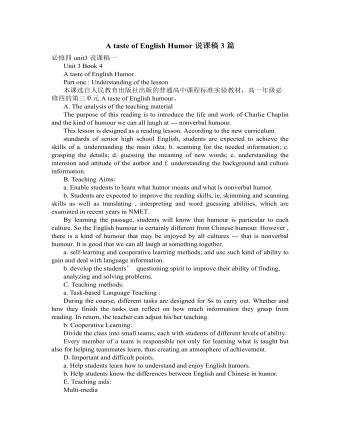
人教版高中英语必修4A taste of English Humor说课稿3篇
Then I would ask them to think of a funny English or Chinese and tell it to partners. While telling stories, they can use expressions and some acting to help make the story funny. 5 minutes would be given to do this.Those stories they told there will be the material for their writing. Soletting them tell it at first is helpful. And they can make a difference between telling a funny story and writing it down. Generally speaking, it is difficult forstudents to write well because they don’t know what to write and how to write. Asking them to tell their own stories at first can help them come up with what to write.After their telling, I would invite someone to share his/her story with all of us and I would write it down on the blackboard.This example story would be used as a sample to illustrate the format of funny story. Different from a story from teacher or textbook, a story from students can obviously become a interesting material to draw students’ attention.Then I would ask the whole class to put this story into several parts. It might be a little bit difficult for them. So I would ask them to find out whether all the sentences are necessary. After delete some sentences, there are 6 sentences left behind. Then they can easily put them into three parts. After interaction with students, I would teach them the right terms for each part and conclude the format of funny story.This step is the key and difficult point in my lesson. So I mainly usetask-based teaching method in this part and the task for students was divided into several stages. With the separated difficult level, students can find there are usually three parts in writing. They can also learn to write without the unnecessary parts in the process of analyzing. And then I wouldn’t rush to tell them the right terms to them directly. Instead, I would ask them to name them by their own. A confused mind is better for acquiring knowledge.While-writing:Then I would give students 7 minutes to write down this story, without other requirements.With all the preparations in pre-writing, students’ difficulties were cleared. So it would be much easier for them to write down the story within 7 minutes. There are no other requirements because students’ first writing is actually a drafting. It would be revise and edit several times later. Writing, as a skill
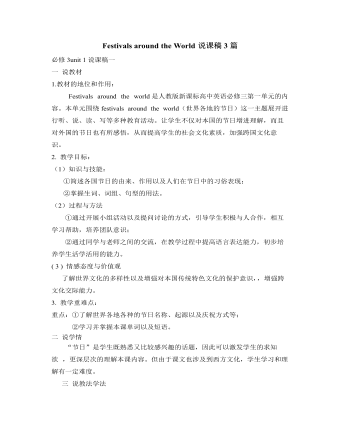
人教版高中英语必修3Festivals around the World说课稿3篇
Teaching plan for Unit 1 book3Good morning, teachers. It’s my great pleasure to be here because I can share my lesson with you and I can learn a lot from it. I’ll begin my lesson from the following four parts, the teaching material, the teaching methods, the studying methods and the teaching procedure.Firstly, let me talk about the teaching material. The content of my lesson is the reading passage festivals and celebrations of Unit 1 Festivals around the world. This passage is about festivals and celebrations. By studying this passage, we’ll enable the students to know that festivals exit everywhere, and many of festivals in different countries celebrate similar ideas. As we all know, the reading passage is the center of each unit. If the Ss can learn it well, it will be helpful to make the Ss learn the rest of this unit.After studying the teaching material, I think the teaching aims are as the followings:1. Knowledge aims:(1) The Ss can master the usage of the important words andexpressions.(2)The Ss can use the __________________ (grammar) in the proper situation.Make students know about the festivals all over the world and the detail of the festivals, such as origin, content, and the date of the holiday festivals.2. Ability aims:(1) Students can talk about festivals and celebrations in English(2) To improve the student’s reading ability, especially their skimming and scanning ability.3. Emotion aims:Make the Ss know about the foreign festivals, and respect other countries’ custom.Next, let’s come to the important points and the difficult points.The important point is how to make the Ss understand the text better and the difficult point is how can they talk about it. secondly, Teaching Methods:1. task-based Language Teaching2. Computer assisted language teaching.3. question-and–answer methodThirdly, Studying Methods:
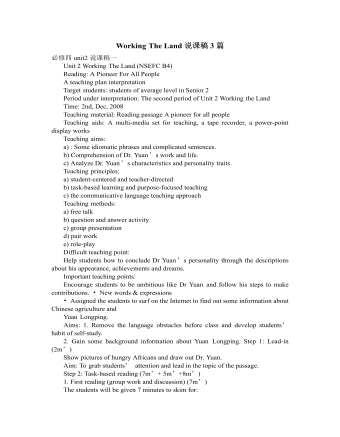
人教版高中英语必修4Working The Land说课稿3篇
Knowledge objectives:(1) to make Ss grasp the usage of words, expressions and sentence structures: statistics, struggle, thanks to, rid of, some patterns for persuasion, the “ing” form as subject and object;(2)to use learnt knowledge to persuade sb.Ability objectives:(1) to develop Ss’ reading skills(skimming, scanning, word guessing);(2) to improve Ss’ speaking, communicating and cooperating skills.Emotional objectives:to make Ss know the contribution of Yuan,and learn his spirit and his simple life time.Teaching important and difficult points:(1) some words, expressions and sentence structures mentioned above;(2)the content of the text;(3)training their reading and speaking skills.Teaching methods: CLT, TBLT,QT.Learning strategies: CLS, QLS, TBLS.Teaching procedures:Step 1 lead-in: (1) teacher plays a piece of recent news from CCTV about the harvest of the super hybrid rice, and ask students whether they know Yuan or not, and talk about him and his contribution.(2)Brain storm: let Ss describe Yuan in their minds including his appearance, his living condition and so on.Step 2 fast reading tasks:(1)teacher introduces Yuan and super hybrid rice(2)make Ss read the text as fast as possible with questions. Such as: what’s the general ideaof this passage? What’s Yuan’ dream? (skimming and scanning skill)Step 3 intensive reading tasks(1)let Ss read the text silently, find topic sentence of each paragraph and draw the difficult sentences and the knowledge what they don’t understand.(words guessing)(2)teacher and Ss talk about the important words, expressions and sentences together, and ask Ss to retell the content of the text.(summarizing and paraphrasing)(3)teacher summarize this part.(4) read again following the courseware.
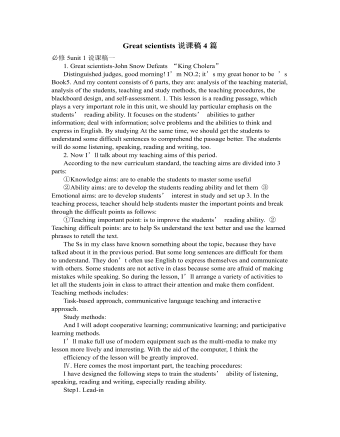
人教版高中英语必修5Great scientists说课稿4篇
通过写文章梗概,培养学生综合运用语言的能力,学习用恰当的英语描述科学家的故事。这是本课的教学难点。教师可以使用完形填空的方式来帮助学生整理语篇,从而来降低难度。本课的教学重点的突破方法是:在阅读前,让学生初步了解得出科学观点所需要的基本程序,从而轻松而自然地导入文章的阅读;在阅读过程中,由易到难设计快速阅读和精读的问题,层层推进各种阅读活动,让学生对阅读内容从整体感知到细节理解,最后深层读懂整篇文章,同时加强阅读策略的指导,让每个学生都主动参与课堂教学活动,最终达到提高阅读能力的目的。Step 4 Post-readingGroup Activities四人小组共同合作,在老师的适当指导下,就以下2个问题展开讨论,让学生就所知、所学、所感和所想融入话题,然后抽若干同学代表作小组发言。1. What do you think about John Snow, and what should we learn from him?2. Cholera was 19th century disease, which two diseases are similar to cholera today? Why?
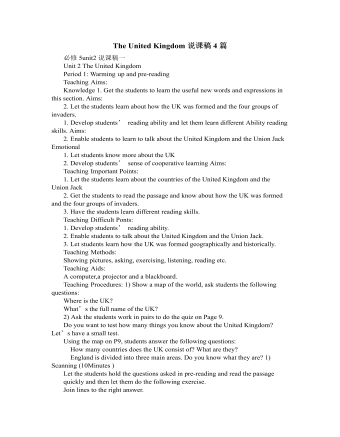
人教版高中英语必修5The United Kingdom说课稿4篇
Teaching Aims:Knowledge 1. Get the students to learn the useful new words and expressions in this section. Aims:2. Let the students learn about how the UK was formed and the four groups of invaders.1. Develop students’ reading ability and let them learn different Ability reading skills. Aims:2. Enable students to learn to talk about the United Kingdom and the Union Jack Emotional 1. Let students know more about the UK2. Develop students’ sense of cooperative learning Aims:Teaching Important Points:1. Let the students learn about the countries of the United Kingdom and the Union Jack2. Get the students to read the passage and know about how the UK was formed and the four groups of invaders.3. Have the students learn different reading skills.Teaching Difficult Ponts:1. Develop students’ reading ability.2. Enable students to talk about the United Kingdom and the Union Jack.3. Let students learn how the UK was formed geographically and historically.Teaching Methods:Showing pictures, asking, exercising, listening, reading etc.Teaching Aids:A computer,a projector and a blackboard.Teaching Procedures: 1) Show a map of the world, ask students the following questions:Where is the UK?What’s the full name of the UK?2) Ask the students work in pairs to do the quiz on Page 9.Do you want to test how many things you know about the United Kingdom? Let’s have a small test.Using the map on P9, students answer the following questions:?How many countries does the UK consist of? What are they??England is divided into three main areas. Do you know what they are? 1) Scanning (10Minutes )Let the students hold the questions asked in pre-reading and read the passagequickly and then let them do the following exercise.Join lines to the right answer.
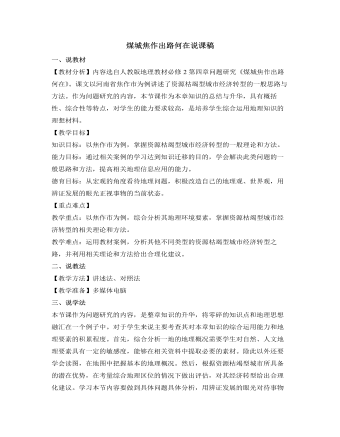
人教版高中地理必修2煤城焦作出路何在说课稿
分析过焦作市的地理概况和产业优势后,就需要针对由于资源枯竭所带来的问题提出合理化的建议。既然是谈经济转型,就应该将话题的范围明确在这一领域内。通过材料3的相关内容,我们了解到焦作市需要在产业结构调整、培育新的优势产业、增强综合竞争力等三个整改方针上下功夫。因而引导学生针对优势与不足提出建议,以三个整改方针为基准,衡量建议的可行性是锻炼学生解决此类问题的有效途径。在此我将教会学生的是解决问题方法而非案例的内容,正所谓“授之以鱼,不如授之以渔”。接下来针对学生的建议和教材资料分析所罗列的10点整改思路,由学生自由发言提出看法,通过教师的指导和学生的讨论,进而确定经济转型建议的具体方案。最后注意将建议与产业优势相对照,看建议是否都是围绕着产业优势而提出的,这样做会加深学生的印象,通过建议和优势的对应关系,将不难找出此类问题的解题思路。
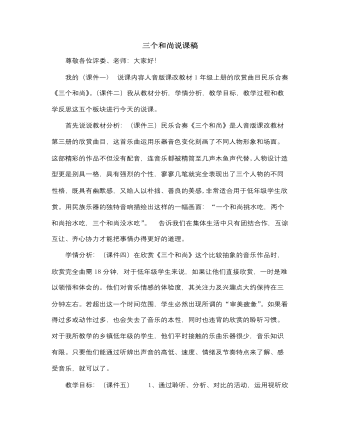
人音版小学音乐一年级上三个和尚说课稿
3.请几组同学表演这几个的场面,其他同学做评委,从模仿表演中享受学习音乐的快乐。五.课堂小结 (阶段目标:以“我的收获”(课件十)帮助学生总结所学内容,知道音乐中,不同的音乐要素可以表现不同的人物、场面)课后反思:(课件十一)在本节音乐欣赏教学中,我坚持以“听”为核心(因为音乐是一门听觉艺术),让学生“带着问题听”、“想着听”、“动着听”、“演着听”等多元化的“听”的形式。一系列“听”的任务不仅提高学生的注意力,而且提高学生“听”的兴趣与“听”的质量。而且我创造和谐的课堂气氛,积极引导学生把对音乐的内心感受大胆地用语言表达出来,让学生主动参与音乐快乐学习的实践中去,创建出有利于学生发展的生动活泼的音乐课堂情景,让学生的了解音乐,感受音乐,融入音乐。
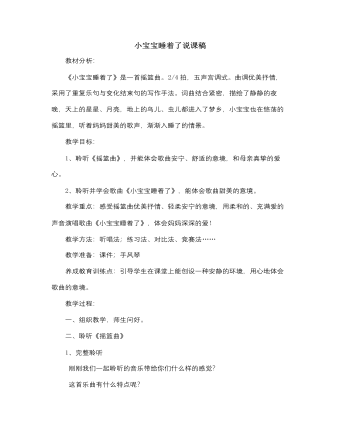
人音版小学音乐一年级下小宝宝睡着了说课稿
三、聆听、表演《小宝宝睡着了》 1、聆听歌曲启发学生说说听到歌曲时感受到了什么?2、复听,跟着歌曲,轻柔地拍节拍。 3、听琴声逐句学唱歌曲。 4、指导学生用连贯、轻柔的声音,唱准、唱好歌曲。 5、重点引导学生说说结尾的处理方式——对比练习,看哪一种方法更恰当 6、引导学生用自己创作的方式为歌曲伴奏、伴舞。 四、小结。 教学反思:一年级课堂上会有一些学生在上课的时候出现喊唱的现象,我在歌曲处理这一环节对歌曲的意境作了这样的描述:静静的夜晚,天上的星星睡了、月亮睡了、地上的鸟儿、虫儿也都进入了梦乡,小宝宝也在悠荡的摇篮里,听着妈妈甜美的歌声,渐渐入睡了。同学们妈妈哄宝宝睡觉唱歌的声音应该是欢快的,还是轻柔的?经过我的描绘和讲解学生理解了在演唱摇篮曲时应该用轻柔的声音,要把每一句都连贯的唱起来,不仅句与句之间要连贯,第一、第二段也要衔接紧凑,轻轻的哼唱出来,体会妈妈哄小宝宝睡觉时是多么的温柔。
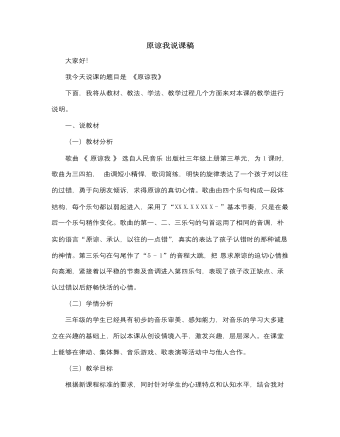
人音版小学音乐三年级上册原谅我说课稿
4)进行分组练唱、对唱、全体学生合唱。在分组练唱过程中,我将在学生中间进行单独指导,询问他们学习的难点并与学生一起解决,然后适当提问个别学生。通过小组唱、对唱等形式进行演唱评比,提高学生演唱热情。这样,不仅加深了学生对歌曲的熟悉程度,还为学生更好地理解歌曲做了铺垫。5)表演唱,通过表演,不仅展示了学生个性、激发学生的创造力、表现力,而且再次加深了学生对歌曲情感的理解和体验。(三)第三环节——拓展延伸通过对歌曲节拍节奏的改编,让学生感受到得到好朋友原谅后又能快乐的游戏的情绪变化,感受到与好朋友在一起是一件幸福快乐的事。本方案的设计,力求体现以人为本的思想,着眼于学生的主动发展,通过充分的音乐实践,培养学生的能力,提高音乐素养;培养学生的合作意识、探究精神。从目标的提出、到过程的安排、学习方法的确定、乃至学习成果的呈现,都让学生有更大的自主性、更多的实践性。

